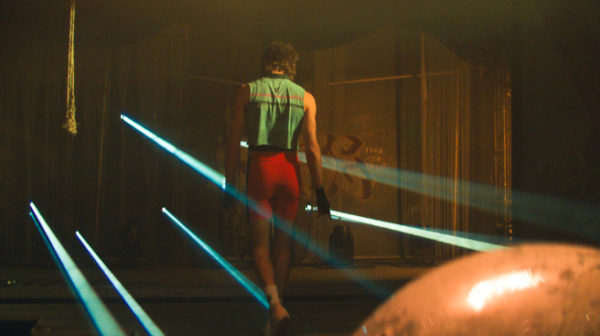
Each week Joe and Terry discuss the most recent episode of Peacock’s reboot of Queer as Folk, alternating between our respective sites.
Spoilers follow for episode 7
Missed a Review? Episode 1 / 2 / 3 / 4 / 5 / 6
Episode 7 “Problematica”: Brodie considers his impact on his friends’ lives; Noah and Julian host a dinner; Mingus gets shocking news; Bussey makes a big decision; Ruthie bonds with the twins; Shar makes a surprising connection.
JOE
One of the things that differs about fictional narratives compared to real life is that in fiction we tend to know who is the protagonist of the story.
In real life, it’s you. It’s your life, so you’re the main character.
In media, the content creator tells us who is the lead. For most of Queer as Folk, creator Stephen Dunn has been telling us that Brodie (Devin Way) is the protagonist. His story is the one that opens the series; he gets the majority of the screen time; and even when other characters take center stage, their narratives are inevitably intertwined with his.
That’s why an episode like “Problematica” is an interesting change of pace. By consciously breaking the plot into five parts, each with their own title card and mostly dedicated to a specific character and storyline, the show revels in the unique experience of each. For at least one episode, this isn’t just Brodie’s story. Each person gets their own slice of the pie.
The result is a greater audience appreciation for what is driving everyone and how they process their experiences. It’s a tried and true storytelling technique (see: Rashomon) and while we’re not seeing the exact same experience through each character’s eyes, “Problematica” offers us a glimpse into one specific day filled with mundane trials and tribulations as nearly everyone in the cast makes some kind of personal break-through.
The ramifications, however, will be significant as most everyone winds up having a negative experience. But hey…that’s where the conflict comes from. Plus: this is the penultimate episode of the season, so we’re all set up for a great, explosive finale.
I’m very curious, Terry, how you responded to each Part? We’ve had plenty of conversations about our lack of interest in Brodie and Mingus (Fin Argus) because so much of their stories feel rote and repetitive. And while I can’t say either of them experienced anything completely revelatory in the course of this episode, each of their Parts do feature strong components.
Brodie’s journey in ‘Part 4: Tunnel’ is arguably the most mundane from a character arc perspective: he takes drugs and proceeds to have a no-good-very-bad-trip that reveals he’s still deeply traumatized and guilty about Daddius (Chris Renfro)’s death. But then you factor in all of the fun audio and visual components that co-writers Dunn and Ryan O’Connell incorporate in the script, and it becomes a fun, exciting section that gives the episode a lift before we shift into the super heavy emotional shit in the final Part.
From a dog mutating into a Muppet to a legitimate horror sequence straight out of Ghost as Brodie is chased by shadows to a Twin Peaks Black Lodge sequence to a Nightmare on Elm Street 3: Dream Warrior puppeteering reference to a Cronenberg body horror bit involving pulling a full-ass piano key out of his gunshot wound, there’s a lot to appreciate about this portion of the episode. ‘Problematica’ is easily one of the most visually compelling episodes of the series to date, and that’s before we even get to Mingus’ multi-staged drag performance (I asked and Dunn delivered!)
Visuals aside, however, what I most appreciated about “Problematica” was how it offered insight into characters that we don’t know exceptionally well. For me, that’s what ‘Part 3: Maybe Mama,’ in which despondent partners Brenda (Kim Cattrall) and Shar (CG) hit a jazz bar to commiserate about their lot in life, is all about.
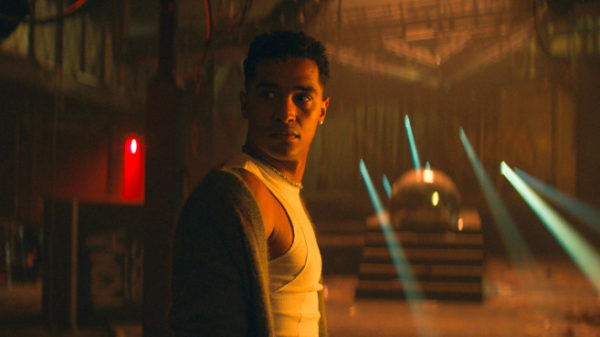
Shar says everything that we’ve been thinking about Ruthie (Jesse James Keitel)’s shitty parenting. What’s fascinating is that a lot of their frustrated experience has nothing to do with Brodie and everything to do with Shar’s negotiated experience of their body (something they have always hated has become a source of life for the twins). Shar also (rightfully up to this point) worries that Ruthie will leave them to raise the twins single handedly.
That opens the door for Brenda’s backstory, which includes a “swamp trash” origin, an early marriage to Winston (Ed Begley Jr.) at age 18 and the feeling that her life is over because no one needs her.
It’s evident from the beginning of the episode that there’s romantic tension between the pair, particularly from Shar’s side as they make overtures about being attracted to white women and placing their hand on Brenda’s thigh. But there’s still something compelling about watching Shar’s stunned expression as Brenda takes the stage for an open mic performance of “Maybe This Time” from Cabaret, which immediately leads to a frantic fingering session in the bathroom.
It’s a doomed development that can only lead to disaster, but Dunn’s shooting and framing of this part – particularly as the vibe shifts from dour personal stories to an intoxicating drunken make-out – perfectly captures the ups and downs of a boozy night out. It’s a great showcase for both actors and the kind of character development that I’ve been craving outside of the usual Brodie & Mingus stuff.
But I’m curious, Terry: did this shake-up in narrative format work for you? Which Part was your favourite and why? And what elicited a more visceral reaction: Julian (O’Connell) and Noah (Johnny Sibilly)’s awkward friend dinner in ‘Part 1: Hawaiian Punch’ or the brotherly showdown in ‘Part 5: Home’?
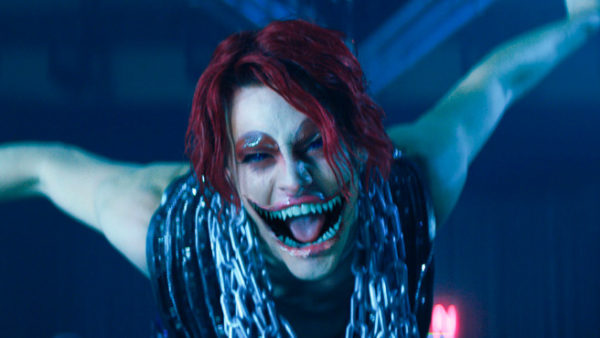
TERRY
Joe, this was an excellent hour of television and kicked up the narrative in exciting ways. Last week, you mentioned the unfortunate and premature cancellation of Genera+ion, a show we covered and, for the most part, were enamored with. That show also staged complex episodes like “Problematica”, allowing stories to be separate but criss-crossing and building to a grand climax. This episode felt exciting and daring, a perfect complement to the last few episodes where Queer as Folk has been hitting its stride.
Goodness, I hope Peacock renews this one for another season.
Before I get to your questions, I wanted to marinate in the hallucinogenic ‘Part IV’ because the horror cred here was on point. From the horrifying body horror to the puppeted piano to a blink-and-you’ll-miss-it Fright Night jaws-mouth homage…this little trippy and surreal venture into horror was everything…even if it was the slightest of the stories. What I loved about this cirque du strange anthology section is that it paid off on the anxiety of watching the first four minisodes play out.
“Problematica” had me on edge and anxious from the very beginning, as the narrative brings two distinctly different sets of friends together for an awkward dinner party. Noah and Julian have been together long enough that they want to show each other off to their friends. As a side note, it’s weird to me that Julian’s “friends” Meg (Hacks stand-out Megan Stalter) and George (Olli Haaskivi) are people who work at the mall who only seem to know him from his time cruising their place of work?
But they’re introduced and when they discover Julian is dating the hunk Noah, the first thing out of Meg’s mouth is, “shut up! You’re dating him? You’re such a babe, I’m sucking you off later.” That’s cringey enough, but then Eric (Lukas Gage, because I’m pretty sure he’s contractually obligated to appear in all queer TV series at this point) and Taylor (Calvin Seabrooks) show up being a lot.
The friends have almost nothing in common, except their utter surprise that Julian could land someone who’s able bodied and conventionally attractive. It’s here that I started sinking down in my couch because this conversation is atrocious. And it only gets worse as the two friend groups cannot find any common ground, and Julian begins over-compensating, explaining that he and Noah met at the same hairdresser (they didn’t) and that his desire to be a flight attendant was a joke (it’s not).
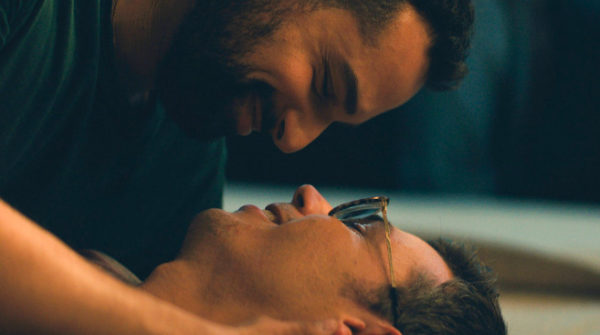
This first Part sets the stage for the disastrous mini stories to follow (while eventually crisscrossing with Brodie’s story and his thrown slushie). And even though it ends with Julian and Noah telling each other they love the other, the reality of Julian’s flight attendant life, flying everywhere and not being together, is obviously weighing heavily on the two of them.
This awkwardness and drama pays off in ‘Part V: Home,’ where Brodie continues on his self-destructive warpath by further othering Brodie with the question, “Do you have Noah shaving you, yet?” This turns into a shoving match and Julian ends up on the ground, Brodie saying, “He started it!” and Noah asking if he’s five. This sequence is followed up with Brodie returning to his mother’s home, almost as if he’s reverting to that nightmare image of him as a child, except this time as a moment of motherly comfort.
To answer your question, the awkward friend date gave me a more visceral response, while Brodie and Julian’s confrontation felt inevitable. It’s been building towards this all season, but there’s more fireworks ahead, I think, with Noah and Julian. Between the flight attendant job, Brodie’s insistence that Julian has found another care-giver and the friend groups confused about Julian and Noah’s relationship, “Problematica” suggests a bittersweet finale moment for the pair of lovers, I think.
My favorite part, though, is ‘Part III: Maybe Mama’ because this vignette surprised the hell out of me and was filmed and staged so beautifully. I’ve wondered from the beginning how much Queer as Folk would use Kim Cattrall because she, like Ed Begley Jr. and, to a lesser extent, Juliette Lewis, feel like stunt casting (ie: guest characters who show up once in awhile).
But Cattrall’s Brenda has been a substantial presence in the series up to this moment that, even though she has been an almost regular, I keep forgetting that she’s integral to the story. What worked great about ‘Maybe Mama’ is the plotting slowed to allow two characters who seem to be very different to have an intimate moment together.
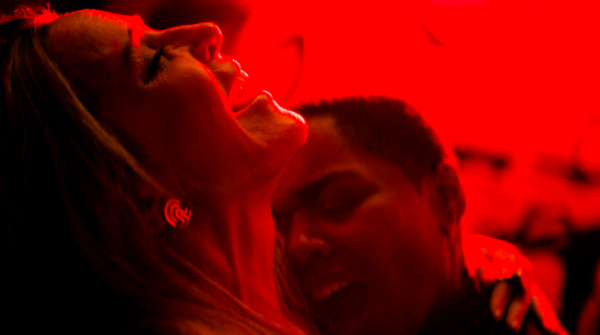
I love the contrast between the two as a white, rich and straight-presenting woman is situated against Shar’s gender fluidity, blackness and working person stature. They seem miles apart but through this conversation, we find two people who are in a relationship that they might regret and while Brenda has married rich, she came from humble beginnings. ‘Maybe Mama’ peels back the layers and shows they have a lot of similarities between them. “I don’t want to raise these kids alone,” Shar tells Brenda.
And while they astutely call out Brenda’s five nannies as help, Brenda cuts to the heart of the problem: It’s not wealth or having help. It’s the emotional support and let’s face it, Ruthie has not been there for Shar or their babies.
But in Brenda, Shar finds someone they can actually talk with and I loved the subtle flirtatiousness between the two before it gets more pronounced. Brenda confessing she had the “self esteem of a reduced fat cottage cheese” to Shar telling her, “go on, Southern Nancy Meyers,” their dialogue is tinged with playful nudges of people who’ve grown to respect each other. So when Shar lays their hand on Brenda’s thigh, my eyes shot open at the prospect of a little fling between them.
Of course, by the time ‘Part V: Home’ comes along, the fantasy moment is over and the two characters are back in their own little realities. Brenda’s text is put on read, Ruthie has a breakdown and apologizes to Shar, and Brenda finds her own child in need of her attention; attention that, like with Ruthie, was probably overdue.
I loved it so much. What a beautifully structured short film about love, loss and fingering, Joe.
But I’ll turn your question back on you: which of these vignettes was your favorite? I know you were spoiled about Mingus’s HIV plot, but what are your thoughts on the way his story plays out in “Problematica”? This vignette, more than the others, balances a heavy topic with darkly acerbic humor and I’m curious what you thought about it and Bussey (Armand Fields)’ role in Mingus’ self-acceptance?
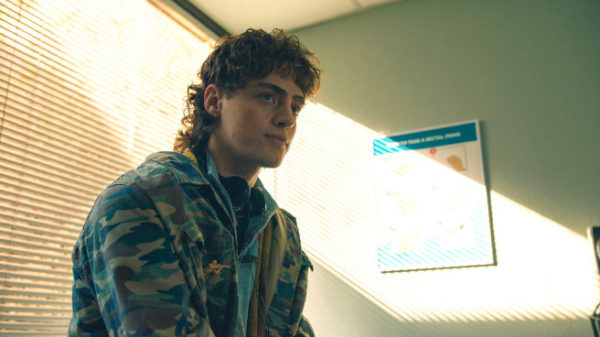
JOE
Part 3 was definitely my favourite because it was so unexpected, but as I considered your anxious reaction to Part 1, I realized how effective it is, too. Introducing a new partner to your friends is always a nerve-wracking prospect and seeing how Julian reacted to the stress felt very relatable, even when the action took on sitcom levels of ridiculousness – what with the spilled zucchini pasta and all.
But yes, we’ve both been skirting around ‘Part 2: Not Alone’ which confirms that Mingus’ recent dip into whore territory has infected him with HIV. As you noted, I was spoiled on this plot point from that cursed The Hollywood Reporter piece, but the cards are pretty clearly on the table when Mingus visits the free clinic to get tested.
What I appreciated most about this storyline is how even though Mingus knows he’s being dramatic to Bussey, his highly emotional reaction feels appropriate. I have more than a few positive friends who are managing the disease and living full lives, but that doesn’t make it easier. The legacy of HIV and AIDS looms large over our community, and particularly for gay men, so being upset, even when the disease is no longer the death sentence it once was, is justifiable.
Naturally it’s nice that Mingus has someone like Bussey on hand to answer all of their questions: patient, calm, just the right amount of snarky. Bussey is a little bit too perfect at times, but in this moment, the drag queen is the perfect mentor to not only act as the living embodiment of what a life with HIV can look like, but why it’s vital for Mingus to return to the world of performing.
Despite all of this praise, however, I hope this isn’t the end of the conversation because this all felt a little too brief (and maybe a little pat). Getting an HIV diagnosis, even in this day and age, isn’t something you can process with a fantasy drag number and an emotionally grounded chat. And while Mingus rightfully realizes that his next step will be the difficult conversation he’ll need to have with Juliette Lewis’ Judy (who is already contending with getting back into dating and a leaky roof!), I want to see this conversation continue.
Our community needs to hear it to keep healing.
Terry, what was your reaction to the HIV storyline? And you mentioned a reckoning for Julian and Noah’s relationship, but what else do you think will happen in the finale?
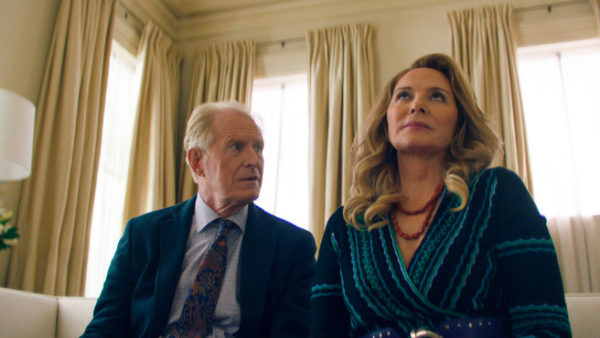
TERRY
It’s difficult, Joe. On one hand I wanted Queer as Folk to be a celebration and not focus on the same kinds of queer trauma we’ve seen recycled over and over. But this season has been full of it in various forms and it’s a lot. It sucks seeing a character who was almost murdered by a homophobic shooter try to find some kind of joy while attempting to forget the pain, only to fall into a different kind of queer trauma. It’s a lot to put on a character in a few, short episodes.
That said, it is, as you mentioned, an important conversation that needs to happen and so far Queer as Folk seems ready and willing to continue it. I have to keep reminding myself that HIV is not the end of the world as it once was; it’s something that, as an elder millennial, I still find myself thinking about because, at one point, if a show were to introduce HIV/AIDS, you know that character is probably going to die. So a show where a person can live with it, treated and kept under control…that’s still pretty revelatory.
As for the finale, we’ll see more about Bussey’s decision to buy Babylon, for sure. I think we’ll finally have some head-to-head conflict between Brodie and…well, everyone? I’m wondering how the episode will tackle the Brenda/Shar/Ruthie situation and whether Brenda will actually divorce her husband. And I’d like for it to bring some resolution to Brodie and Ruthie’s tumultuous situation.
Honestly, though? I just want to see the queers get their anger out by demolishing the inside of Babylon. Hopefully we’ll get some of that catharsis when we go back to Gayly Dreadful for “Sacrilege”, the final (but hopefully not the last) episode of Queer as Folk.
The entire first season of Queer as Folk is available on Peacock